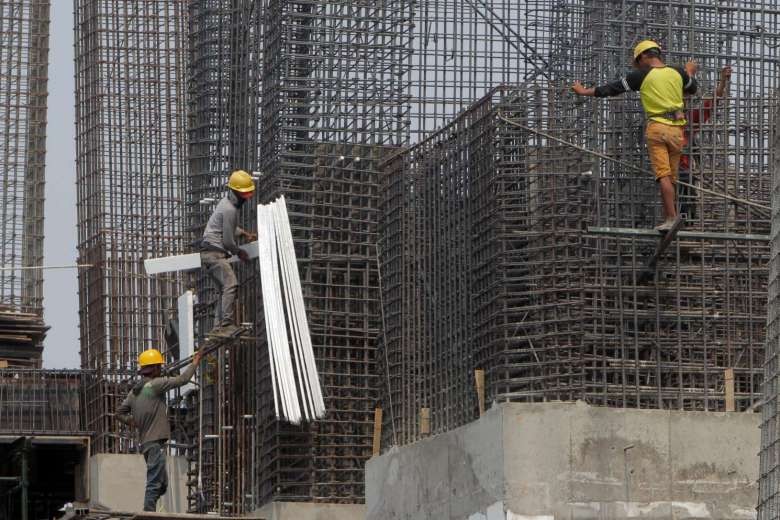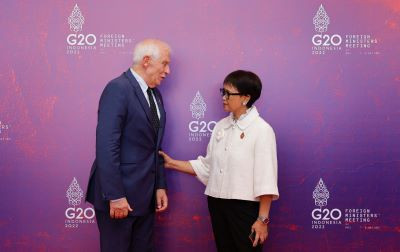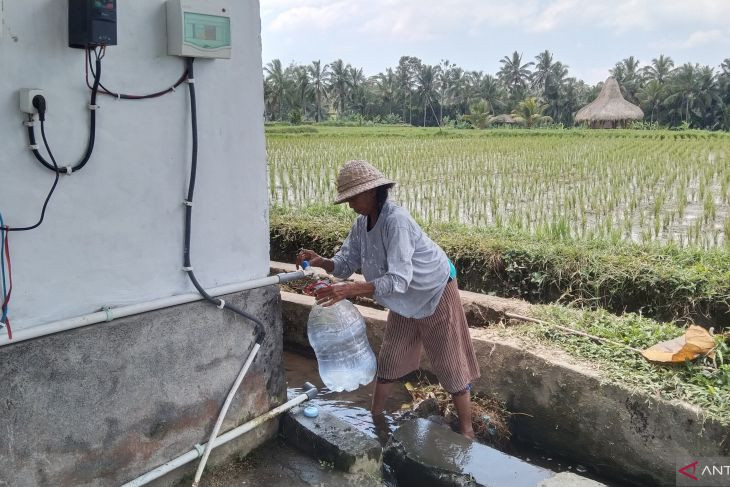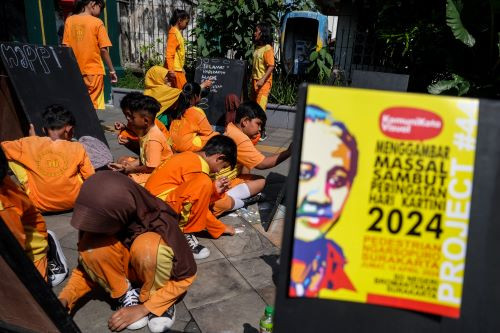State budget: Jokowi’s compromised ambitions
Change Size
 Workers at a construction site in Jakarta, Indonesia, on Oct 5, 2015. (EPA via The Straits Times/-)
Workers at a construction site in Jakarta, Indonesia, on Oct 5, 2015. (EPA via The Straits Times/-)
O
ne week after she was appointed finance minister, Sri Mulyani Indrawati realized that the central government tax revenue in 2016 would be far below the target stated in the revised 2016 budget. She estimated there would be a shortfall of Rp 219 trillion (US$16.65 billion). If expenditure in 2016 was maintained at revised budget level, the deficit would soar to 4.1 percent of gross domestic product (GDP), surpassing the 3 percent threshold mandated by the law.
Sri Mulyani decided to cut expenditure Rp 133 trillion to keep the projected deficit in 2016 at 2.5 percent of GDP.
From this saga, it is clear that formulating an overly ambitious and unrealistic budget like the government did in 2016 budget is bad. It is bad for politics because it generates too high expectations and erodes government credibility and it is bad for the market, because investors do not believe budget figures are credible. So with this in mind, the government came forward with the 2017 draft budget, which is hopefully more realistic.
Total revenue in the 2017 budget is estimated at Rp 1.73 quadrillion, or 2.7 percent less than in the 2016 revised budget. But if compared with the new revenue estimate in 2016 where according to Sri Mulyani there will be a shortfall of Rp 219 trillion in tax revenue, the revenue in 2017 will be 11 percent higher than in 2016.
Total expenditure in the 2017 draft budget is Rp 2.07 quadrillion, 0. 6 percent less than in the revised 2016 budget. But when compared with the new 2016 figures it is an increase of 6 percent or an increase of only 2 percent after inflation. The fiscal stimulus will be very small indeed. The deficit is projected at 2. 4 percent of GDP, a similar trend for the last four years.
Part of the tax revenue in 2017 will come from the tax amnesty for three months since the program will run until March 2017.
Budgeting tax revenues in 2016 and 2017 is a tricky exercise, because of the uncertain outcome of the tax amnesty. The ambitious tax amnesty goal has increased the risk of additional, potentially large spending cuts, including priority spending projects later in the year.
The result of the tax amnesty poses the greatest risk to both the 2016 and 2017 budgets. There are too many unknowns in these programs, as this is the first time the government has launched the programs on a great scale. The uncertainties have a bearing on the size of the deficit, and hence the debt financing that the government has to raise to cover the deficit.
Progress in redemption from the tax amnesty is not encouraging. As per Aug 14, the government had received only Rp 545 billion from
Rp 26.7 trillion in assets declared by 4,200 tax payers, despite aggressive campaigning by the government. This could endanger the 2016 revised budget and the 2017 budget, as they rely heavily on the success of the tax amnesty program.
The 2017 draft budget is based on assumptions that there will be a slight improvement in the GDP growth, rupiah exchange rate and oil prices. But the assumed oil lifting of 750,000 barrels per day is the lowest in several years.
With so many constraints in collecting tax revenue, the government is facing a delicate problem of balancing spending for infrastructure and social protection, between providing a fiscal stimulus and managing the deficit. The room for maneuver between spending items is restricted by several mandatory spending programs that according to the existing laws have to be implemented. Spending for education for instance must be 20 percent of the budget, and spending for health must be pegged at 5 percent of the budget.
Spending for infrastructure is budgeted at Rp 337 trillion. Although it is 17 percent higher than in 2016, it is lower than the budget for education, which is Rp 414 trillion. Indeed, the whole budget for social expenditure such as education, health and social protection would amount to Rp 676 trillion, twice the amount of infrastructure budget. This pattern of spending would have an impact on economic growth, poverty reduction and income inequality. If properly implemented this pattern of expenditure would improve programs in poverty and income equality reduction but at the expense of economic growth.
Although the education budget dominates social spending, there are still substantial problems with education, as these have not translated into an improved learning outcome. Indonesia’s spending on secondary education is not pro-poor and its spending on tertiary education is regressive. According to a report by the Program for International Student Assessment (PISA) mandated by the OECD, on math, science and reading skills, Indonesian students only scored 376, below countries like Columbia, Jordan and Qatar, and well below the scores of Singaporean students (573) and South Korea (554).
Expenditure that is the responsibility of regions has been growing in importance in recent years, especially with the introduction of village funds. Transfers to regions will amount to 36 percent of the total 2017 budget, compared with 31 percent in 2013. Yet doubts have been raised on the ability of regional governments to disburse efficiently their allocated expenditure. There is still more than Rp 240 trillion in undisbursed funds sitting in regional government bank accounts. In view of the growing importance of the regions’ role in budget expenditure, the government should impose a carrot and stick policy, to impose penalties on regions that do not perform well and to give incentives to those that do well in managing their budgets.
President Joko ”Jokowi” Widodo has to face the reality that problems with state revenue collection and setting program priorities are more complicated than foreseen . He will have to face the fact that the execution of his signature programs in infrastructure will proceed at a slower pace than he has expected. Figures in the 2017 draft budget are a reflection of how far he has compromised his ambitions.
____________________________________________
The writer is a commissioner in a publicly listed oil and gas service company. The views expressed are his own









